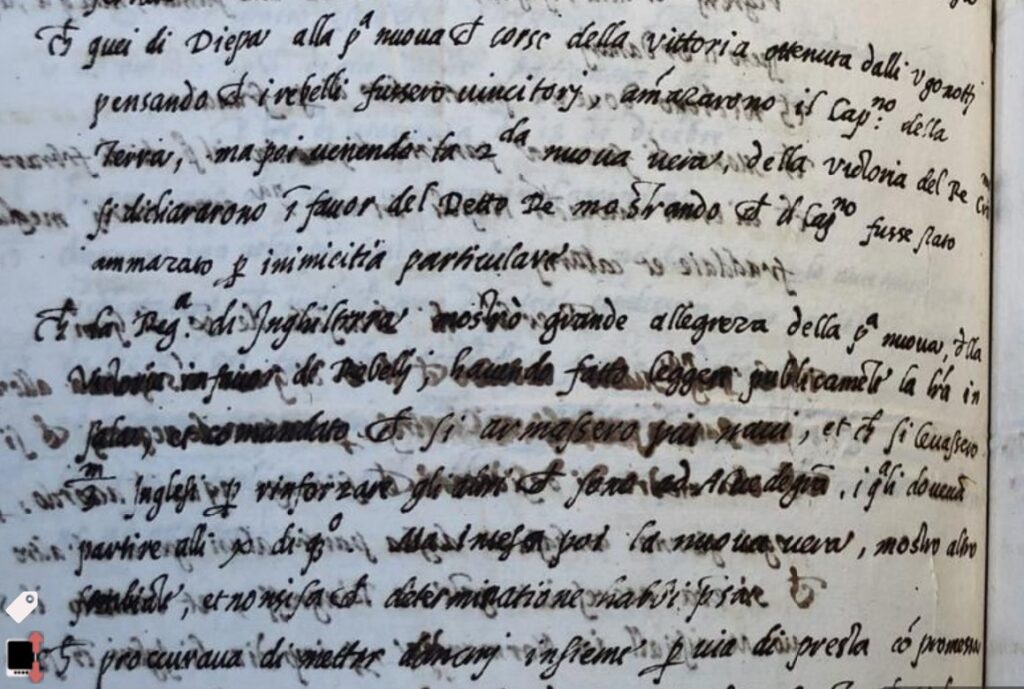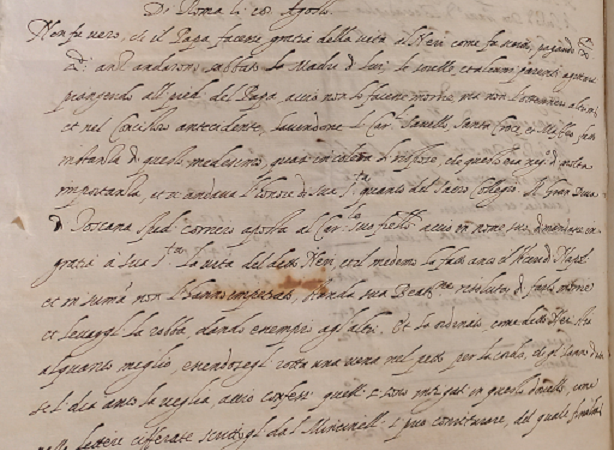By Brendan Dooley and Davide Boerio
FAKE NEWS, lies, inventions: the news writers were regarded as unreliable, although their work was necessary. Pope Pius V’s Apostolic Constitution of 17 marzo 1572 entitled "Against writers, propagators or scribes of the bulletins commonly called avvisi” [Contra scribentes, exemplantes et dictantes monito vulgo dicta gli Avisi] proclaimed:
“... A new sect having recently arisen of illicitly curious men, who propose, accept and write every piece of news concerning public and private affairs, or of which they come to know or which through their malice they invent, regarding their own country and abroad, mixing without any restraint the false, the true and the uncertain... and most of them, even for a base profit, send this news gathered from the voices of the people here and there, after making small summaries and without the name of the writer... wishing to get rid of these inconveniences... we forbid anyone from daring to compile such summaries in the future, or seeking to receive, copy, disseminate or send those composed by others.. ."
“... Essendo sorta da non molto tempo una nuova setta di uomini illecitamente curiosi, i quali propongono, accettano e scrivono ogni notizia riguardante gli affari pubblici e privati, o di cui vengono a conoscenza o che per loro malignità inventino, tanto del proprio paese, quanto dall'estero, mescolando senza alcun ritegno il falso, il vero e l'incerto... e la maggior parte di loro, anche per un vile guadagno, spediscono di qua e di là queste notizie raccolte dalle voci del popolo, dopo aver fatto piccoli riassunti e senza nome di chi li scrive... Volendo Noi togliere di mezzo questi inconvenienti... proibiamo che nessuno osi in futuro compilare siffatti riassunti, né voglia ricevere, copiare, diffondere o spedire quelli composti da altri..."
But what was the history of malicious falsehoods before and after Pius V singled them out for prosecution?
For one thing, they had a name: carote, i.e., carrots!
The inquiry leads us to the earliest histories of news; and in this case, Salvatore Bongi’s fundamental “Le prime gazzette in Italia,” in Nuova Antologia di Scienze, Lettere ed Arti, XI,1869, pp.311-46.
Concerning the first regular news reports, Bongi says:
The writers "were considered to be liars from the earliest times; and since the Italians already used the word carrot metaphorically, to indicate a witty invention, Giovanni Maria Cecchi,” a sixteenth-century critic, “ imagined that Mercury had given birth to the gazette, by a magical trick, from a leftover carrot of Erymanto the forest pig."
So let’s look at two examples of “carote” or misleading stories, later denied, that had significant repercussions at the time.
THE HUGUENOTS DIDN’T WIN
We begin with an avviso from 16 January 1563 that talks about a first (false) news item announcing the victory of Huguenots, and a second (true) news item announcing their defeat. However, due to the first (probably) malicious story, a man loses his life.

[https://mia.medici.org/Mia/json/src/ShowArchivalLocationInManuscriptViewer/show?volumeId=1104&fileId=476497 ] Mediceo del Principato, vol. 3079, fols. 192 verso - 193 recto
That the people of Dieppe, hearing the first news concerning a victory obtained by the Huguenots, thinking that the rebels were victorious, killed the Captain of the land, but then, when the second news came, of the victory of the Most Christian King, they declared themselves in favor of the said King, claiming that the captain had been killed because of some kind of grudge.
Che quei di Diepa alla prima nuova che corse della vittoria ottenuta dalli Ugonotti pensando che i rebelli fussero vincitori, ammazarono il Capitano della Terra, ma poi venendo la seconda nuova vera, della victoria del Rè Cristianissimo si dichiararono in favor del detto Rè mostrando che il capitano fusse stato ammazato per inimicitia particulare.
Queen Elizabeth I of England becomes interested on hearing of the pretended Huguenot victory, calling up an army of 3000 to aid them at the front. When the news is contradicted the whole plan gets put on hold.
That the Queen of England showed great joy at the first news of the Rebellion's Victory in France, having had the letter read publicly.....and commanded that more ships be armed, and that 3000 English were raised to reinforce the others…. But after having heard the true news, changed her mind, and it is not known what determination she is to make.
Che la Regina di Inghilterra mostrò grande allegreza della prima nuova della Vittoria in Francia de Rebelli, havendo fatta leggere pubblicamente la lettera .....et commandato che si armassero più navi, et che si levassero 3m Inglesi per rinforzare gli altri... Ma intesa poi la nuova vera, mostrò altre sembianze, et non si sa che determinatione habbi per fare
Another “carota,” also has significant consequences– 20 years later in Rome.
THE PRISONER WASN’T FREED
Rome 18 aug 1582

Mediceo del Principato, vol. 3083, fol. 313v
It was not true that the Pope [Gregory XIII] ordered [the prisoner] Neri not to be executed, as has been written, in return for 70,000 scudi; on the contrary, [Neri’s] mother, sisters and some relatives went on Saturday to plead for mercy, weeping at the feet of the Pope, so that he would not let him die, but they did not succeed, and in the previous consistory, Cardinals Savello, Santa Croce and Maffeo having made a similar request, He replied almost in anger, that denying this mercy was very important, and the honor of His Holiness as well as that of the Sacred College were at stake.
Non fu vero, che il Papa [Gregorio XIII] facesse gratia della vita al Neri come fu scritto, pagando 70m scudi; anzi andarono sabbato la madre di lui, le sorelle et alcuni parenti a gratiare piangendo alli piedi del Papa, acciò non lo facesse morire, ma non l’ottennero altrimenti et nel Concistoro antecedente, havendone li Cardinali Savello, Santa Croce et Maffeo fatto istanza di questo medesimo, quasi in colera si rispose, che questo era negazione di molta importanza, et v’andava l’honore di Sua Santità quanto del Sacro Collegio.
In this case, the false news about a pardon, rather than encouraging leniency, had the opposite effect of hardening the pope’s resolve, from his standpoint in order to not seem malleable to the nonsense being propagated in the news.
FURTHER READING
Giovanni Maria Cecchi, Poesie inedite, Napoli 1866
Salvatore Bongi, “Le prime gazzette in Italia,” Nuova Antologia di Scienze, Lettere ed Arti, XI,1869
